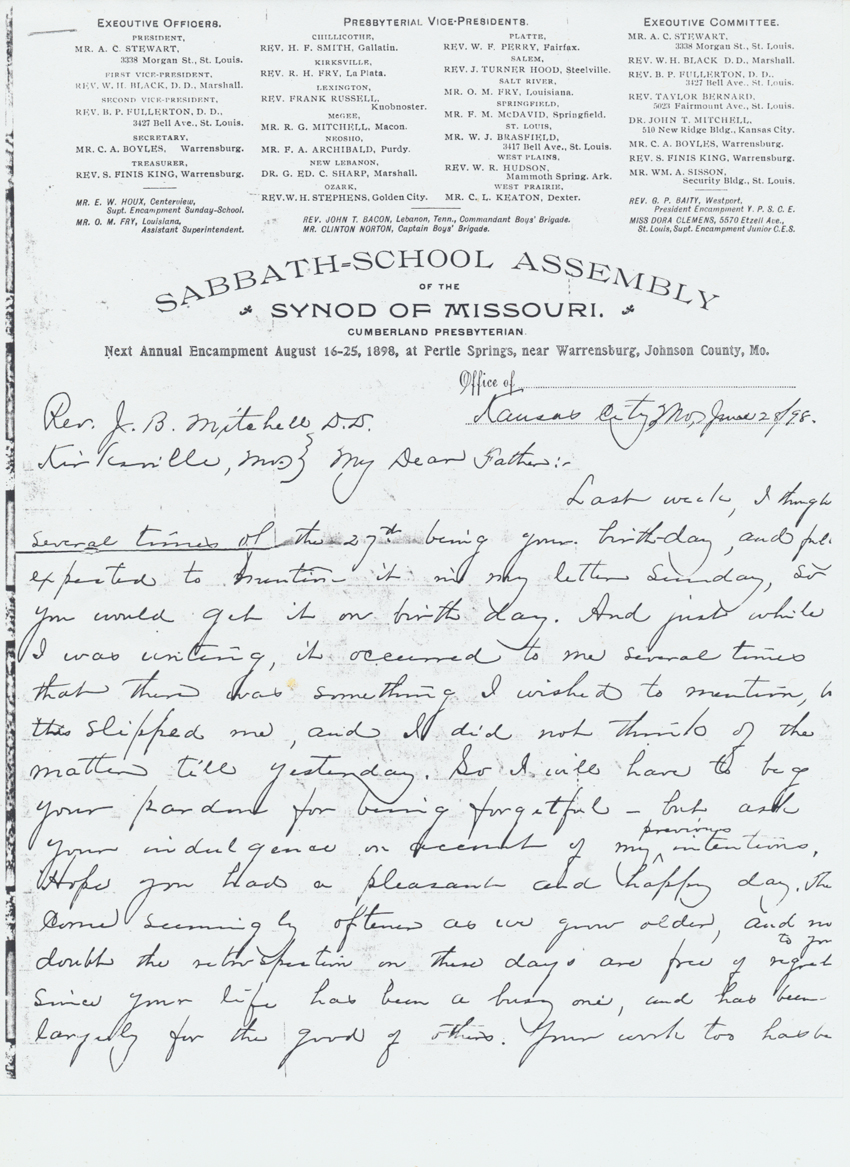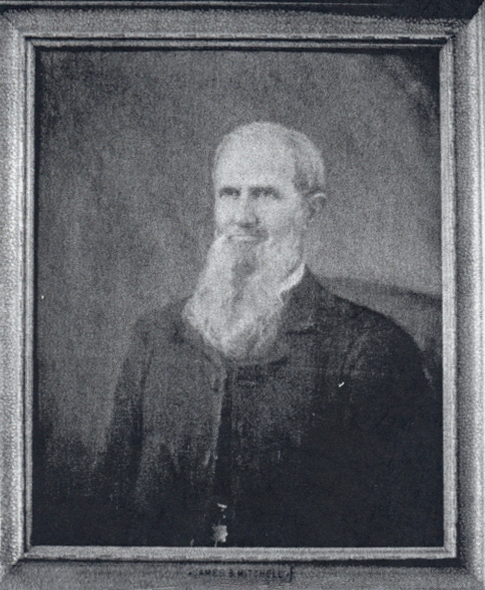Tag: james bourne mitchell
-

Letter from Robert Gwyn Mitchell to James Bourne Mitchell, June 28, 1898
Note: Robert Gwyn Mitchell, of our line, was a son of the Rev. James Bourne Mitchell, born June 27 1821 in Abingdon, Virginia, died March 12 1901 at Kirksville, Missouri. Robert mentions in the letter his brother Orlando “Lando” McDavid Mitchell and his wife Clara Wilson and their two children Horace Wilson and Martha. Thank…
-

J. B. Mitchell is Honored on Founders Day (Nov 26, 1931 news article on Missouri Valley College)
Thanks to Jim Mitchell for the scan of the news articles and the image of James Bourne Mitchell’s portrait. Below is my transcription. J. B. Mitchell is Honored on Founders Day M. V. C. Conducts an Impressive Program Yesterday Founders Day at Missouri Valley College was observed yesterday, beginning in the morning at Stewart Chapel…
-

Excerpts from “Biography of Mrs. Susan Addie Holliday Mitchell” (b. 1853, daughter of Thompson Holliday) by Callie Mitchell Jones
Thank you to Jim Mitchell, descendant of Orlando, who sent me the typewritten copy of this excerpt. Below is my transcript, followed by some notes. In 1868, at aged 15, Addie Holliday went to McGee College. Her father Thompson Holliday was very happy to have her go to McGee College for he loved Dr. Mitchell…
-

Will of James Bourne Mitchell, Attested March 6, 1900
In the Name of God, Amen. I, James B. Mitchell, of Kirksville, Adair, Co., Missouri, being of sound mind, and believing in the existence of the One true and living God, the Father and Holy Spirit, in the immortality and responsibility of man, in the verbal inspiration of the holy scriptures, in the resurrection of…
-

James Bourne Mitchell and Family
Dorothy Mitchell McClure gave this to me when I was young. I didn’t make a note who had written it and am unsure who it was. Dorothy added that the below mentioned Missouri Valley College was her Alma Mater. * * * * * James Bourne Mitchell and family by a descendant of J. B.…
-

On McGee College at College Mound, Missouri
McGee College College Mound, Missouri Taken from the history of Macon County, MO (1910), pages 143-144 McGee College, at College Mound, was incorporated under act of the 17th General Assembly of Missouri, approved February 23, 1853. The original board of directors was composed as follows: James Dysart, Thomas McCormack, Stephen Gibson, Isaac Teter, Stewart Christel,…
-

Bench and Bar Bio of Robert G. Mitchell
Bench and Bar of St. Louis, Kansas City, Jefferson City and other Missouri Cities. Biographical Sketches. St. Louis and Chicago, American Biographical Publishing Company, 1884. Robert G. MITCHELL Macon Robert Gwyn Mitchell of the firm of Dysart and Mitchell, is a son of James B. and Martha C. (Dysart) Mitchell, and dates his birth in…
-

I ALMOST ENVY YOU; YOU SEEM SO NEAR HOME
Written by the Rev. James Bourne Mitchell b. 1821 June 27 in Abingdon, Washington, Virginia, died 1901 March 21 in Kirksville, Adair, Missouri. * * * * * I ALMOST ENVY YOU; YOU SEEM SO NEAR HOME Rev. J. B. MITCHELL, D.D. Published in “The Observer” date unknown Thus wrote a dear brother in the…
-

James Bourne Mitchell Autobiography
James B. Mitchell was born 27 June 1821, died March 12, 1901. He was the grandson of Robert Craig–son of John Mitchell and Ann Middleton Craig. He married Martha C. Dysart, born 5 March 1825–died February 19, 1912. They resided in Randolph Co. MO. This autobiography is had courtesy of Mitchell Noll. * * *…
-

ANNE MIDDLETON CRAIG MITCHELL TRAVEL JOURNAL, 1836
This is the transcript of the journal kept by Anne Middleton CRAIG MITCHELL of her travel from Abingdon, Washington, Virginia to Randolph County, Missouri in 1836. This was passed to family by John T. MITCHELL of Kansas City, MO, as given by Anne’s son, Rev. J. B. MITCHELL. Mitchell NOLL passed it along to me.…